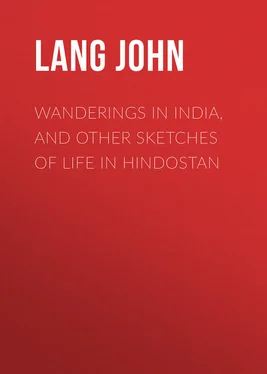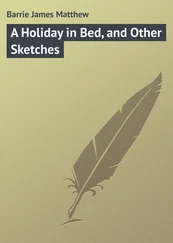John Lang - Wanderings in India, and Other Sketches of Life in Hindostan
Здесь есть возможность читать онлайн «John Lang - Wanderings in India, and Other Sketches of Life in Hindostan» — ознакомительный отрывок электронной книги совершенно бесплатно, а после прочтения отрывка купить полную версию. В некоторых случаях можно слушать аудио, скачать через торрент в формате fb2 и присутствует краткое содержание. Жанр: literature_19, foreign_antique, foreign_prose, Путешествия и география, на английском языке. Описание произведения, (предисловие) а так же отзывы посетителей доступны на портале библиотеки ЛибКат.
- Название:Wanderings in India, and Other Sketches of Life in Hindostan
- Автор:
- Жанр:
- Год:неизвестен
- ISBN:нет данных
- Рейтинг книги:3 / 5. Голосов: 1
-
Избранное:Добавить в избранное
- Отзывы:
-
Ваша оценка:
- 60
- 1
- 2
- 3
- 4
- 5
Wanderings in India, and Other Sketches of Life in Hindostan: краткое содержание, описание и аннотация
Предлагаем к чтению аннотацию, описание, краткое содержание или предисловие (зависит от того, что написал сам автор книги «Wanderings in India, and Other Sketches of Life in Hindostan»). Если вы не нашли необходимую информацию о книге — напишите в комментариях, мы постараемся отыскать её.
Wanderings in India, and Other Sketches of Life in Hindostan — читать онлайн ознакомительный отрывок
Ниже представлен текст книги, разбитый по страницам. Система сохранения места последней прочитанной страницы, позволяет с удобством читать онлайн бесплатно книгу «Wanderings in India, and Other Sketches of Life in Hindostan», без необходимости каждый раз заново искать на чём Вы остановились. Поставьте закладку, и сможете в любой момент перейти на страницу, на которой закончили чтение.
Интервал:
Закладка:
The Jhansi Rajah had been particularly faithful to the British Government, and Lord William Bentinck had presented the brother of the late Rajah with a British ensign, and a letter giving him the title of "Rajah," and assuring him that that title, and the independence attached to it, would be guaranteed by the British Government to him, the Rajah, and his heirs and successors (by adoption). That that treaty (for such it purported to be) of Lord William Bentinck was violated, without the slightest shadow of a pretence, there cannot be any sort of doubt. In the time of the Peishwah, the late Rajah of Jhansi was simply a large zemindar (landholder), and had he remained untitled there can be no question that his last wishes, so far as the disposition of his property was concerned, would have been attended to. It was the acceptance of the "Rajahship" which led to the confiscation of his estates, and the exchange of 6000 l. a year for 25,000 l. a year. Strange as that assertion may seem to the reader, it is nevertheless true.
I was at Agra when I received the Ranee's letter, and Agra is two days' journey. Even as I travelled from Jhansi, I sympathized with the woman. The boy whom the Rajah had adopted was only six years old, and during his minority, that is to say, until he had attained his eighteenth year, the Ranee – so the Rajah willed – was to have been the Regent, and the boy's guardian; and it is no small matter for a woman – a native woman of rank, too – to give up such a position and become a pensioner, even on 6000 l. a year. Let me detail the particulars of my journey to the residence of the Ranee of Jhansi. I got into my palanquin at dusk, and on the following morning, at daylight, arrived at Gwalior. The Rajah of Jhansi had a small house about a mile and a half from the cantonment, which was used as a halting-place, and thither I was taken by the minister and the vakeel who accompanied me. At ten o'clock, after I had breakfasted and smoked my hookah, it was proposed that we "go on at once." The day was very warm, but the Ranee had sent a large and comfortable palanquin carriage; in short, it was more like a small room than a carriage, fitted up as it was with every convenience, including even a punkah, which was pulled from the outside by a servant, who sat upon a foot-board. In the carriage, beside myself and the minister and vakeel, was a khansamah, or butler, who, with the apparatus between his knees, kept on cooling water, and wine, and beer, in order that, whenever I felt thirsty, I might be supplied at a moment's notice. This enormous carriage was drawn by a pair of horses of immense strength and swiftness. Each stood about seventeen hands high. The late Rajah had imported them from France at a cost of 1500 l. The road was rather rough in many places, but, on the average, we got over it at the rate of about nine miles an hour. At about two o'clock in the day we entered the Jhansi territory, having changed horses twice, and we had now some nine miles to drive. Hitherto we had been escorted only by four sowars (horsemen), but now our escort amounted to about fifty, each horseman carrying an immense spear, and dressed much in the same way as the Irregular Cavalry in the pay of the East India Company. And along the road, at intervals of a few hundred yards, were horsemen drawn up, and as we passed, they joined the cavalcade; so that by the time we came in sight of the fortress – if those old weak walls, surmounted by some nine pieces of old ordnance of inferior calibre, deserved the name – the whole strength of the Jhansi cavalry was in attendance. The carriage was driven to a place called "the Rajah's garden," where I alighted, and was conducted by the financial minister and the vakeel and other servants of state, to a large tent, which was pitched beneath a clump of gigantic mango trees. The tent, which was that in which the late Rajah used to receive the civil and military officers of the British Government, was elegantly fitted up, and carpeted; and at least a dozen domestic servants were ready to do my bidding. I must not omit to mention that the companions of my journey – the minister and the vakeel – were both men of good ability and pleasing manners. They were, moreover, men of learning, so that my time upon the road had been beguiled very agreeably.
The Ranee had consulted one of the many Brahmins who were supported by her as to the most propitious hour for me to come to the purdah behind which she sat; and the Brahmins had told her that it must be between the setting of the sun and the rising of the moon, which was then near her full; in other words, between half-past five and half-past six o'clock.
This important matter having been communicated to me, I expressed myself perfectly satisfied with the time of the appointment, and ordered dinner accordingly. This done, the financial minister, after betraying some embarrassment, intimated that he wished to speak to me on a rather delicate subject, and that, with my permission, he would order all the menial servants in attendance on me, including my own sirdar-bearer (valet), to leave the tent and stand at a distance. I complied, of course, and presently found myself alone with only the "officials" (eight or nine in number) of the little native state of Jhansi. What the finance minister wished to ask me was this – Would I consent to leave my shoes at the door when I entered the Ranee's apartment? I inquired if the Governor-General's agent did so. He replied that the Governor-General's agent had never had an interview with the Ranee; and that the late Rajah had never received any European gentleman in the private apartments of the palace, but in a room set apart for the purpose, or in the tent in which we were conversing. I was in some difficulty, and scarcely knew what to say, for I had a few years previously declined to be presented to the King of Delhi, who insisted on Europeans taking off their shoes when they entered his presence. The idea was repugnant to my mind, and I said as much to the minister of the late Rajah of Jhansi; and I asked him whether he would attend a levée at the palace of the Queen of England, if informed that he must enter her Majesty's presence with his head uncovered, as did all her subjects, from the lowest to the highest. To this question he would not give me a direct answer, but remarked, "You may wear your hat, Sahib; the Ranee will not mind that. On the contrary, she will regard it as an additional mark of respect towards her." Now this was what I did not want. My desire was, that she should consider the wearing of my hat, supposing I consented to take off my shoes, as a species of compromise on her part as well as on my part. But I was so amused with this bargaining, as it were, that I consented; giving them distinctly to understand, however, that it was to be considered not as a compliment to her rank and dignity, but to her sex, and her sex alone. That great point settled, I partook of a very sumptuous repast that was prepared for me, and awaited patiently the setting of the sun or the rising of the moon, determined, however, that I would wear my hat – a black "wide-awake," covered with a white turban.
The hour came, and the white elephant (an Albino, one of the very few in all India), bearing on his immense back a silver houdah, trimmed with red velvet, was brought to the tent. I ascended the steps, which were also covered with red velvet, and took my place. The mahoot, or elephant-driver, was attired in the most gorgeous manner. The ministers of state, mounted on white Arabs, rode on either side of the elephant; the Jhansi cavalry lining the road to the palace, and thus forming an avenue. The palace was about half a mile distant from my encampment ground.
Ere long we arrived at the gates, at which the attendants on foot began to knock violently. A wicket was opened, and closed hastily. Information was then sent to the Ranee; and, after a delay of about ten minutes, the "hookum" (order) came to open the gates. I entered on the elephant, and alighted in a court-yard. The evening was very warm, and I fancied that I should be suffocated by the crowd of natives (retainers) who flocked around me. Observing my discomfiture, the minister imperiously commanded them to "stand back!" After another brief delay, I was asked to ascend a very narrow stone staircase, and on the landing was met by a native gentleman, who was some relative to the Ranee. He showed me first into one room and then into another. These rooms (six or seven), like all rooms of the kind, were unfurnished, save and except that the floors were carpeted; but from the ceiling punkahs and chandeliers were suspended, and on the walls were native pictures of Hindoo gods and goddesses, with here and there a large mirror. At length I was led to the door of a room, at which the native gentleman knocked. A female voice from within inquired, "Who is there?"
Читать дальшеИнтервал:
Закладка:
Похожие книги на «Wanderings in India, and Other Sketches of Life in Hindostan»
Представляем Вашему вниманию похожие книги на «Wanderings in India, and Other Sketches of Life in Hindostan» списком для выбора. Мы отобрали схожую по названию и смыслу литературу в надежде предоставить читателям больше вариантов отыскать новые, интересные, ещё непрочитанные произведения.
Обсуждение, отзывы о книге «Wanderings in India, and Other Sketches of Life in Hindostan» и просто собственные мнения читателей. Оставьте ваши комментарии, напишите, что Вы думаете о произведении, его смысле или главных героях. Укажите что конкретно понравилось, а что нет, и почему Вы так считаете.












